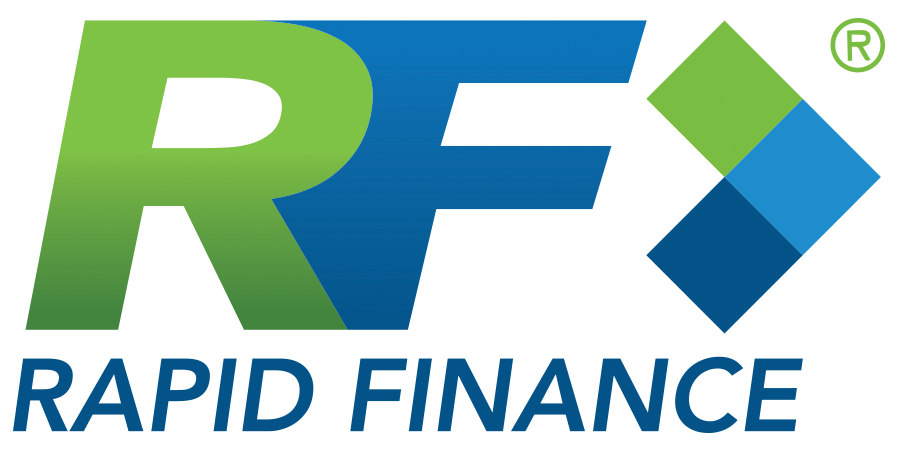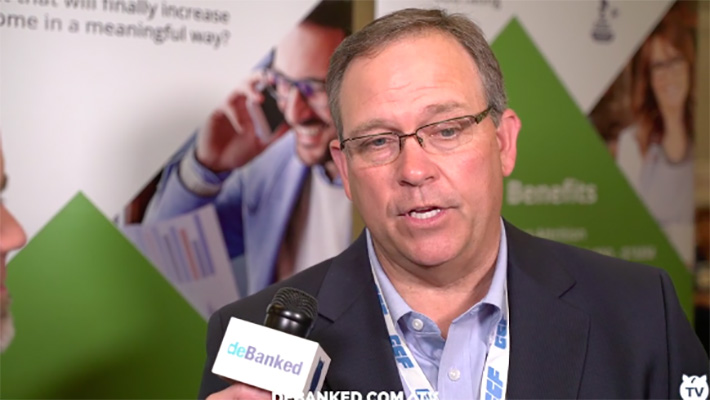 |  |  |
Related Headlines
| 09/27/2024 | Rapid Finance, Gestalt integrate |
| 09/09/2024 | Rapid Finance integrates with Q2 |
| 08/08/2024 | Rapid Finance: Diamond at B2B Finance Expo |
| 04/16/2024 | Rapid Finance introduces new card |
| 01/25/2024 | Rapid Finance partners w/ LoanPro |
Related Videos
A Word From Rapid Finance | Making Rapid Finance Artwork |
Jim Fink - Rapid Finance - SEAA 2021 | |
Stories
Rapid Finance a Diamond Sponsor of B2B Finance Expo
August 8, 2024 Rapid Finance is a Diamond Sponsor at the inaugural B2B Finance Expo taking place at Wynn Las Vegas from September 23-24. The conference will bring together the leading lenders, funders, and brokers from across the spectrum of commercial finance, leasing, mortgage, and revenue-based capital products.
Rapid Finance is a Diamond Sponsor at the inaugural B2B Finance Expo taking place at Wynn Las Vegas from September 23-24. The conference will bring together the leading lenders, funders, and brokers from across the spectrum of commercial finance, leasing, mortgage, and revenue-based capital products.
The Small Business Finance Association (SBFA), of which Rapid Finance is a founding board member, will play an important role at the event. The SBFA is a group of technology-driven financial service companies specifically focused on providing efficient and responsible capital to small and medium businesses – independent businesses – across America. Rapid Finance was founded in 2005.
“At Rapid Finance, we are deeply committed to empowering small business owners with the capital they need to thrive,” said Will Tumulty, CEO of Rapid Finance. “As a founding board member of the SBFA, we proudly support independent businesses across America. Events like the B2B Finance Expo are crucial in bringing together industry leaders and fostering collaboration and innovation, and we are excited to play a role in launching this event and contributing to the commercial finance sector’s growth.”
The B2B Finance Expo is powered by deBanked which has produced nearly two dozen commercial finance related conferences since 2017. To register CLICK HERE.
Rapid Finance Has Evolved Into a Three-Piece Business
October 12, 2022 Historically, Rapid Finance has been a lender, but over the last few years the company has expanded into other areas including portfolio servicing and technology. It’s a three-piece business, one that now includes a new wholly owned subsidiary, Thrive.
Historically, Rapid Finance has been a lender, but over the last few years the company has expanded into other areas including portfolio servicing and technology. It’s a three-piece business, one that now includes a new wholly owned subsidiary, Thrive.
Thrive is described as an end-to-end digital lending platform that can be used by banks, credit unions, or other organizations to offer small business loans faster and easier to their customers.
Kunal Sehgal, co-founder and CEO at Thrive, said that Thrive’s technology can handle everything “from the application intake, to actual data collation and aggregation, to underwriting to decisioning, to origination to closing, and then servicing as well.”
The product gives Rapid a unique tool in its arsenal, given the company’s background. Will Tumulty, CEO at Rapid Finance, explained that Thrive’s technology will be greatly enhanced by Rapid’s own experience in the lending business.
“If you want to do a partnership with Rapid [through Thrive], you’re not just signing up for software,” Tumulty told deBanked. “You can get software, you can get potentially balance sheet access, you get expertise in servicing and credit management that Rapid has developed over more than 15 years in small business lending. And we think that’s a big difference for companies that are looking for a partner to help them get into the small business lending space.”
The acquisition was announced on October 3rd at American Banker’s Small Business Banking conference and is part of Rapid’s recent corporate rebrand and restructuring, which includes a new logo and website.
Rapid Finance Resumes Funding
July 29, 2020Rapid Finance is funding again, according to posts made by the company on social media.
“Now that most states are in the process of beginning to function normally, many small businesses are back in operation and we’re excited to announce that we have resumed accepting NEW financing applications!”
Why RapidAdvance Is Now Rapid Finance
February 7, 2019 RapidAdvance has officially changed its name to Rapid Finance.
RapidAdvance has officially changed its name to Rapid Finance.
“The term ‘advance’ is out of favor these days,” said founder and Chairman of Rapid Finance Jeremy Brown. “It also doesn’t reflect who we are as a company or what our brand is. We put our clients in a variety of different financing solutions including factoring, term loans and equipment leasing. ‘Advance’ is very narrow and old school. ‘Finance’ represents where the company has evolved to and where we’re going.”
The company’s logo is also new, but Brown said that they purposely retained the same color scheme to make the change as seamless as possible.
“Before we had an arrow through the word ‘rapid,’” Brown said. “I think the three squares [in the new logo] represent an arrow head so that there’s continuity with the old logo.”
Consistent with the rationale for the company’s name change, Brown said that their business is about 85% term loans and only 15% merchant cash advance, healthcare cash advance and bridge loans. Through partners, Rapid Finance also provides their customers with access to SBA loans, factoring, asset based loans, commercial real estate and lines of credit. By the second quarter of this year, Brown expects that they will offer their own line of credit product.
Rapid Finance is broadly diversified by business type, according to Brown. He said that no business category accounts for more than 25% of their business. As for acquiring new business, Brown said that 60% comes from partners/brokers and 40% comes from their internal direct marketing efforts.
Brown said that Rapid Finance, which employs about 200 people, has hired about 25 over the last six months. Most of the hires were in the technology and sales departments, both internal sales and sales reps who work with ISO partners. He also said they expect to fund between $550 and $600 million this year.
Founded in 2005, the company’s employees are divided between its headquarters in Bethesda, MD and another office in Detroit, MI, which houses Rapid Finance’s direct sales and marketing teams.
Former CFO of RapidAdvance Moves On to Beyond Finance, Inc.
June 27, 2017Rajesh Rao has taken the CFO position at Beyond Finance Inc., according to LinkedIn. He served as RapidAdvance’s CFO and Head of Credit Analytics and Product Strategy from October 2015 to about the end of May of this year.
Rao had come to Rapid after 13 years at Capital One where his last title was Managing Vice President.
Rapid Capital Funding Acquires American Finance Solutions
October 8, 2014 Miami, Florida-based Rapid Capital Funding will acquire Anaheim, California-based American Finance Solutions today in perhaps one of the most significant deals in merchant cash advance history.
Miami, Florida-based Rapid Capital Funding will acquire Anaheim, California-based American Finance Solutions today in perhaps one of the most significant deals in merchant cash advance history.
Rapid Capital Funding, not to be confused with RapidAdvance, is led by the company’s founder Craig Hecker. Hecker and AFS’s CEO Scott Griest broke the news to me on a call together. “It’s a roll-up,” Griest said. AFS will continue to operate under their brand name for the time being and Griest will remain a leader in the company.
Meanwhile, the operations of the two companies will begin to merge, with Hecker confirming already that their head underwriter, Andrew Hernandez, was in California getting up to speed on AFS’s operations.
The news comes less than five months after American Finance Solutions struck an equity deal with CapFin partners. I am unsure if CapFin is still involved in the company.
 Griest and Hecker were both excited about working together. “Griest has done a great job managing the sales partner channel,” Hecker said. Griest will continue to develop those relationships for the company.
Griest and Hecker were both excited about working together. “Griest has done a great job managing the sales partner channel,” Hecker said. Griest will continue to develop those relationships for the company.
This is the first major merger in the industry. Historically, just about all of the equity deals in merchant cash advance have been acquisitions by institutional investment groups. This is a consolidation.
RCF, while based in Miami, has an office in New York City. The AFS deal puts them on the ground in the 3rd major industry hub.
The two executives hinted that this deal was just the beginning.
Northteq’s Aurora Platform Powers ElmBlue Capital’s Equipment Finance Launch
February 12, 2024[MINNEAPOLIS, MN, February 12, 2024] – Northteq, LLC, a leading provider of Salesforce loan origination solutions, is thrilled to support the launch of ElmBlue Capital, an emerging lender in the equipment finance market. Co-founded by industry veterans Greg Bourdon, Paul Reny, and Jake Broom, ElmBlue Capital is leveraging Northteq’s Aurora platform to streamline operations and deliver an automated digital lending experience to its customers and vendors.
“We knew we wanted the power and flexibility of Salesforce, and Northteq’s Aurora platform was the perfect match to quickly operationalize our vision,” said Greg Bourdon, co-founder of ElmBlue Capital. “Aurora allowed us to select the features we need now while laying a solid foundation for our future operations to grow.”
The integration of Aurora is a central component of ElmBlue’s business strategy, providing the scalability and flexibility that is critical to compete in the rapidly evolving equipment finance industry. Aurora’s automation and seamless third-party integrations provide real-time data access for vendors, streamlining processes while enhancing transparency and speed in operations.
“We are placing an emphasis on providing resources and financial tools for our partners that expand beyond the scope of what currently exists in the equipment finance space today,” Paul Reny, co-founder of ElmBlue added. “Our focus on automating our workflows and leveraging technology from the onset will ensure our level of service remains consistently high, regardless of capacity or market conditions.”
ElmBlue’s strong operational foundation not only allows them to compete with industry veterans, but also sets them apart through key differentiators such as:
- Fully Automated: ElmBlue launched with Northteq’s out-of-the-box, fully automated loan origination platform, Aurora. This turnkey solution, designed for deployment in weeks, not months, takes deals to signed documents in minutes, streamlining front-end operations while ensuring compliance with industry standards.
- Agile and Future-ready: Aurora’s agile, open architecture and ability to seamlessly integrate with Salesforce AppExchange partners will enable ElmBlue to rapidly adapt to market and customer needs. This ensures that their business model is scalable and poised for future growth, keeping them at the forefront of industry advancements.
- Improved Vendor and Customer Relations: Aurora’s real-time data access and streamlined processes create an unparalleled user experience, helping ElmBlue build transparency and trust with its vendor partners and borrowers.
“Partnering with Northteq has been instrumental in actualizing our vision for ElmBlue,” Jake Broom, co-founder of ElmBlue noted. “Our strategic emphasis on establishing a scalable and efficient operation from inception has positioned us for sustained success in the long run.”
To learn more about ElmBlue Capital’s financing capabilities or to become a vendor partner, visit elmblue.com.
To learn more about the Aurora system and the automation tools Northteq used to support ElmBlue Capital’s business launch, visit northteq.com.
About Northteq
Northteq, LLC is a Minneapolis, Minnesota-based fintech company that has helped over 175 lenders provide their customers, vendors, and employees with intuitive, thoughtfully designed lending solutions. Aurora, Northteq’s flagship product, is an automated, Salesforce powered loan origination system and partner portal. They also offer turnkey Salesforce apps created through key partnerships with fintech industry leaders including Middesk, PayNet, FICO, Equifax, Experian, D&B, TimeValue, LexisNexis, Nintex, Ocrolus, Plaid, and many more.
Northteq is now primarily owned by Arthur Ventures, a respected Minneapolis-based early growth capital firm known for leading investments in B2B software companies. This partnership positions Northteq for continued growth and innovation. Since 2013, Arthur Ventures has partnered with over 50 companies across the United States and Canada. For more information, please visit northteq.com.
About ElmBlue Capital
ElmBlue Capital is a fintech-focused equipment financing lender. Committed to transparency, integrity, and partnership, ElmBlue Capital aims to build long-term relationships, supporting clients and vendors in the trucking and transportation, manufacturing, food processing, packaging, and construction industries. To learn more, visit: elmblue.com.
# # #
Top Industry Execs Attend Small Business Finance Leaders Summit in Washington DC
January 29, 2024 Fifty top C-level executives attended the Small Business Finance Leaders Summit in Washington DC last week to discuss the economy, small business finance, policy issues, regulatory impacts, and industry best practices. Co-hosted by two major trade organizations, the Small Business Finance Association (SBFA) and the Innovative Lending Platform Association (ILPA), it was invite-only and open to members of both.
Fifty top C-level executives attended the Small Business Finance Leaders Summit in Washington DC last week to discuss the economy, small business finance, policy issues, regulatory impacts, and industry best practices. Co-hosted by two major trade organizations, the Small Business Finance Association (SBFA) and the Innovative Lending Platform Association (ILPA), it was invite-only and open to members of both.
Speakers included US Senator Roger Marshall, Tom Sullivan from the US Chamber of Commerce, Holly Wade from the National Federation of Independent Business, Aaron Klein from Brookings, Will Tumulty from Rapid Finance, Justin Bakes from Forward Financing, Kirk Chartier from OnDeck, and Steve Allocca from Funding Circle, among others.
“As our industry matures, it’s important to provide industry leaders with an opportunity to connect and engage with high-level thought leaders,” said Steve Denis, Executive Director of the SBFA. “We believe our C-level Summit complements the Broker Fair and other industry conferences like Money 20/20 or Nexus. We hope to expand our Summit in June to bring in some new industry voices and will continue to focus on high-end content that is meaningful and strategic for our members and other top industry leaders.”
The organizations are planning another Summit in early June to build upon the success.

Rapid... rapid finance back up and funding new deals?... |
Rapid Amortization Events... rapid finance and nfas (which co is this) had a rae reported by kroll bond agency?... |
See Post... rapid finance. i hope these guys rebound., , at least commission points are back in play for some people. par - 15, bizfund - 12... |
































